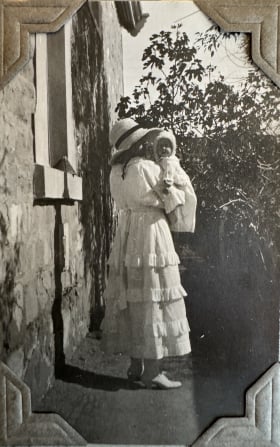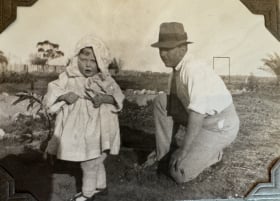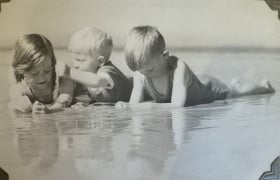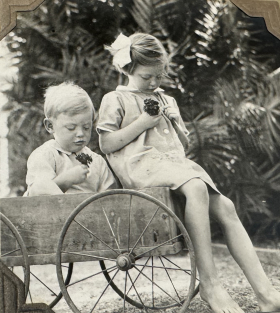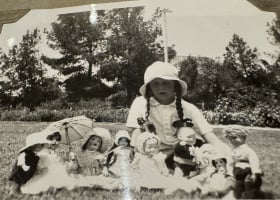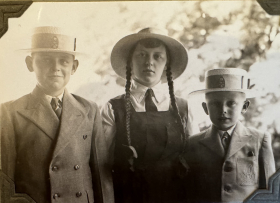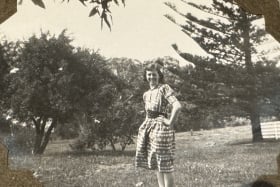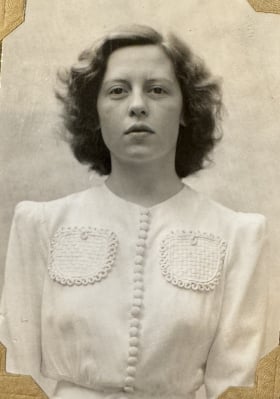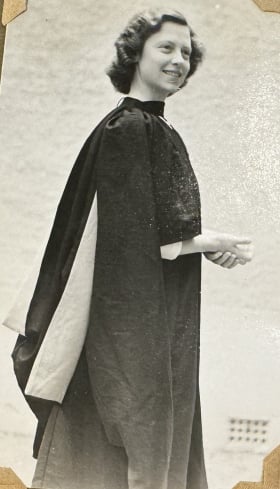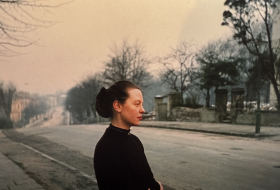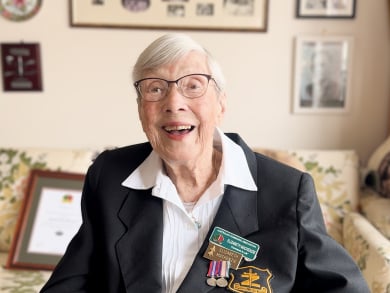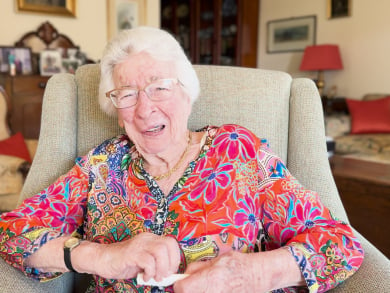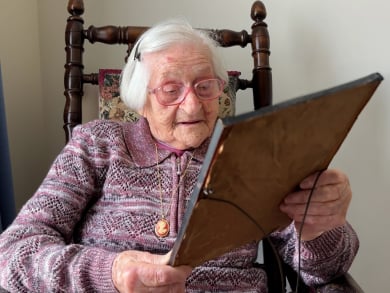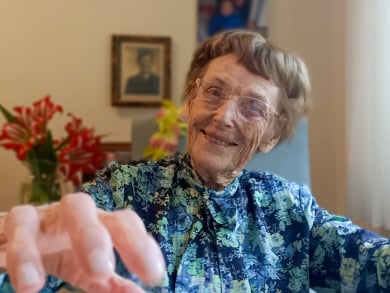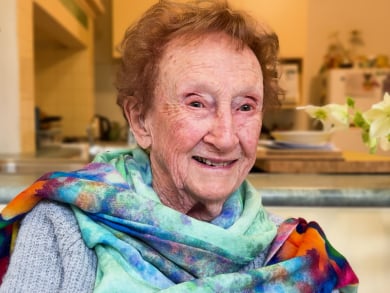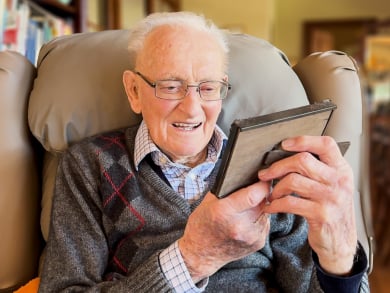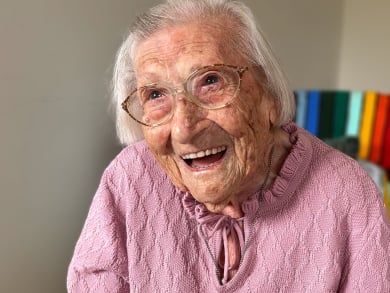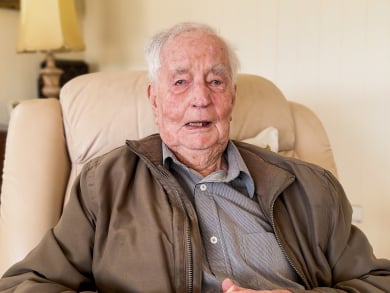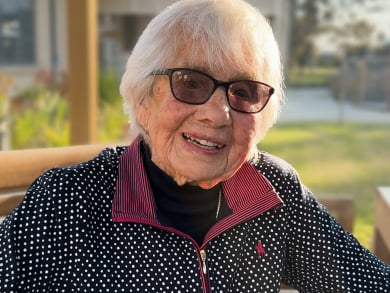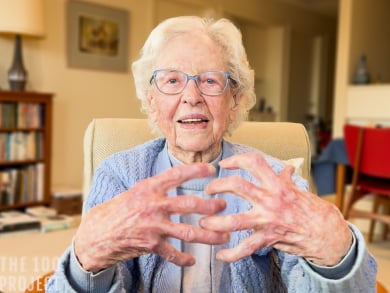Closed captioned icon
View audio transcription
Full name is Barbara Woodward.
I was born at Port Pirie
in South Australia,
up towards Port Augusta, in 1921.
My mother's name is Marjorie Moffat Wardell.
And my father was Oliver Holmes Woodward.
"My father actually met her
when she was about 14,"
"and he said he never could
explain his feelings for her."
"Father was a tunneler
in the First World War"
and being the Victorian gentleman,
he wrote to her father to say,
did he mind if he corresponded
with Marjorie,
just as writing to a soldier,
not telling her
that he cared about her.
That's my mother's
"engagement photograph,
wearing the miniature"
medals of her fiancé.
In 1934, father had written up
his experiences as a tunneler
"for the Australasian
Institute of Mining and Metallurgy"
"and then later on,
he thought he wanted to record"
his own
experiences for himself and the family.
He wrote my story of the Great War.
In those days they were almost...
"I don't know
whether they were officially told"
"but they were not expected
to talk about it."
Which was wrong.
Both from their point of view and from
from ours really.
And a man
"ran across a copy of this book
and read it and said, "
“What the devil were miners doing in the war?”
What were tunnelers?
And when he'd read the book,
he was determined to make
"some sort of a film
to honour them, really."
And this is
the film.
Woodward?
I understand you’re a demolition man?
Yes, sir.
"It was father that actually threw
the switch."
That blew
the trenches up.
But because he was underground,
he didn't see the result.
I have two brothers younger than myself.
"One, three
and the other six years younger."
"My father after his services
in the First World War, was working"
with the smeltery at Port Pirie,
which smelts the ore from Broken Hill.
My childhood memories
don't really begin
until I was about six,
when he was manager
of the smeltery.
Father was strict but very fair.
And because he knew that we would
always behave ourselves with him
and do as we were told, he used to take us
to the places that he worked at.
So I grew up
with memories of
roaring furnaces, smeltery and
casting lead and
Port Pirie was a strange sort of a place.
When you were a child
"you're interested in,
but you don't question"
the place that you lived in.
And it really was quite
an extraordinary harbour.
Piles of wheat
"that were waiting
to be shipped by the clipper ships."
"So that you had clipper
ships at one end of it and steamers"
at the other end loading lead.
I went to school
at Port Pirie West
because father believed that
you should go to the government school.
"And I began French
because there was a woman."
who had come to Port Pirie who was German
"and why she was teaching French
and not German, I don't know,"
she taught us the international symbols
for pronunciation for learning a language
after dancing class on Saturday mornings.
My father made an overseas trip
on behalf of the company in 1934
and he was away for eight months
by ship and train and...
Whereas now you’d fly over and back in
you know, ten days sort of thing.
"He was offered this job
to manage the north mine in Broken Hill."
"And he and my mother,
I never questioned them on this,"
but I should have,
had to decide wit h him in London
and she here,
whether he took this job.
This new job.
When you had to
book a telephone conversation
"and sit
and wait for your call to come through,"
or send cables, and
what a decision they had to make.
Anyway, father became
"the manager of North Broken Hill,
and I lived in Broken Hill"
"about four years
as a secondary high school student."
"Broken Hill
High School at the time was a sort of"
high school TAFE mixture.
I was in the academic stream, but it also
had a stream which enabled
girls to manage a house,
or boys to do metalwork or woodwork.
And then back to Adelaide.
Woodlands Girls at Glenelg.
When I was going to university,
everybody had to do something
for the War.
All the boys dug up the university lawns
to make trenches that we would leap into
if the bombing came to us.
"But we were sent
to the children's hospital"
because the nurses who were overworked
and underpaid, got a break
while we looked after their,
mostly polio patients.
And also I side track, had a
certificate of proficiency
in netting for camouflage
of trucks and things like that.
The Adelaide University
was one of the acceptable universities
for the Sorbonne.
And I had majored in French
anyway so I was going to spend
a year in France at the Sorbonne.
"I did morphology,
which was a form of words."
"The hostel that we were living
in, which was on the Boulevard San Michel,"
"just opposite the Luxembourg Gardens,
was entirely female,"
and a very famous American lady,
Miss Watson, and Miss Watson
"she was able to help
a number of people escape."
during the war at this student hostel.
Because the hostel was founded by America,
"we got into a lot of places that we
otherwise"
might not have been able to see.
"museums and special churches
and every weekend"
there was some sort of organization
for the American girls, and the two
mug Australian girls who were living there
were able to join in.
"We did see a number of things
that we wouldn't have"
"otherwise had the opportunity ever to see
probably."
"Went overseas in 1950 and came back
to Australia almost four years later."
Mother and father were in Hobart.
So I finished up holidaying there
until I got a job
through father's interests,
because he was still a director
of North Broken Hill, and said,
you know, if you ever hear of a job
that might suit Barbara, because
in Hobart in those days,
you were probably just behind a counter
or in typing pool or something like that.
So I get the job
running the office for Sir Henry Somerset.
Associated Pulp and Paper Mills Limited
which made paper in Burnie.
His mother is my second godmother.
So, you know, it's all been like this.
Perhaps that I didn’t marry.
No, I just sort of pottered along.
I wasn’t particularly
happy or particularly unhappy.
Maybe that’s how I’ve lived as long as I have.
Barbara Woodward
"I grew up with memories of roaring furnaces"
From Port Pirie to Paris!
Born in Port Pirie in South Australia, Barbara’s upbringing amidst the smelter and industrial harbour shaped her early years. She moved with her parents to the remote mining town of Broken Hill. Barbara’s father was a tunneller in World War I. His memoirs inspired the film, ‘Beneath Hill 60’. Following her years studying French at Adelaide University, Barbara travelled to Paris in 1950 to attend the Sorbonne.
